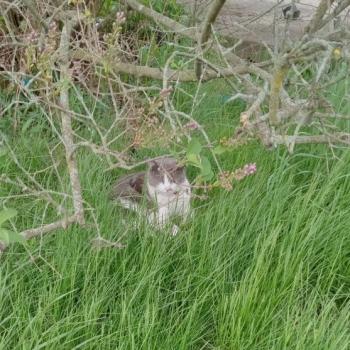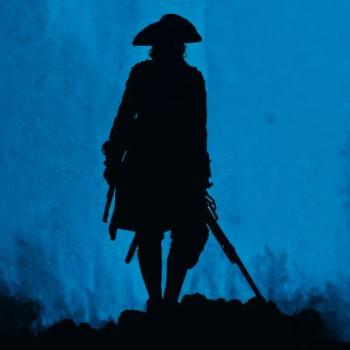You served in the Navy in Hawaii from 1979 to 1982. As a devotee to the seafaring "Uncle Manny" myself, I have to wonder if you have an affinity for Manannan mac Lir?
I was only in Hawaii for part of that time. I spent a good chunk of my enlistment at the Bangor submarine base on Puget Sound as well, which is how I came to live out here in the first place.
Manannán is a very large part of my personal spiritual practice. I've done several large-scale rituals for or with him over the years, including spending three days in vigil out camping on the Washington coast seeking his aid. Every year near the summer solstice I do a ritual of paying rent to Manannán, which is a Manx tradition that's mentioned in the Manx Traditionary Ballad.
I work with him as a gatekeeper and, in some ways, as a psychopomp within the Gaelic tradition. He has affiliations with but is apparently not strictly a part of the Tuatha Dé Danann, and I've found him a really fascinating figure. He's one of the deities who has his own altar in my home, rather than having to share his space with someone else. His guidance has had a huge influence on my work and my practice. There's a very nice website out there called the Temple of Manannan Mac Lir that has a good bit of material on him, including artwork, links to articles, and rituals.
You're participating in a Military Pagan blog project being put together by Jason Pitzl-Waters of The Wild Hunt. Can you tell us a bit about that?
The new blog started up very recently and is called Warriors and Kin, and it's a part of the Pagan Newswire Collective project. Jason has been really good about finding people from different parts of military culture to write as bloggers. We have family members, active duty, and retired members, as well as folks from different parts of the political spectrum. All of us have different perspectives on military service and what it means to or has done to us. It's just finding its feet, but I think it will be a really interesting project, looking at different aspects of military life and warrior traditions from a Pagan perspective.
Jason spoke to me about the project back in February when we met at PantheaCon. He's very interested in exploring all different aspects of Pagan culture, from the arts to politics to news of import to Pagans and their friends and allies. I'm quite excited about participating. My personal focus has been on issues of women veterans and service members, as this has been my own personal experience. I'm also interested in the Veterans Administration system and disabled veterans, looking at what services are available and how being a Pagan may affect our interactions with that system. I'm seeing some interesting changes in the last couple of years, particularly in the area of the VA addressing spirituality in its counseling programs, as well as an increasing awareness of military sexual trauma. The VA has a very long way to go yet, but they're making some moves in the right direction, at least in places like Seattle. I know that rural VA hospitals and clinics still have very antiquated attitudes and equipment and some real difficulties in actually serving the needs of veterans, particularly women veterans.
I understand you're working on a book about "poetic madness." It's a common thread in Celtic myth that brilliance in poetry, divination, and riddles is the product of an encounter with madness. My favorite example of this is the portrayal of Nimue in Bernard Cornwell's Arthurian trilogy. Why is encountering madness so important in poetry? "Fire in the head" sounds profound, but isn't it also dangerous? Didn't we invent Prozac to prevent that sort of thing?
I wouldn't say that brilliance in poetry and such are strictly the product of an encounter with madness. The tradition says that when one wishes to become a poet, the search may result in poetry, madness, or death. Madness in this context is, in a lot of ways, a partial failure of the poet to fully integrate their experience. Seeking poetry is a search for an initiatory experience and sometimes that experience is traumatic and results in an inability to cope with society in normative ways. In an essay I recently wrote, I discussed the "geilta," the mad poets like Suibhne and Myrddin, as being similar to those who suffer from post-traumatic stress disorder. Poetry can become a coping mechanism, a healing path, or simply an expression of the experiences one has in the depths of this kind of suffering. Yet it isn't the madness that brings about the poetry. The spark has to be there beforehand or there's no art to it at all. The poetry that happens here is a result of an attempt to cope creatively rather than entirely succumbing to despair and dying of it.
The book I'm working on deals with geilt as one way to look at poetry as a healing path within the CR tradition. For many years I've wanted to write a book on filidecht, but I found that I really needed to write about this aspect of filidecht before I could address the more normative poetic tradition. Geilt is a part of filidecht that deals with a lot of the exceptions to the usual rules, so I think it's important to discuss that in some depth because those exceptions are important.




